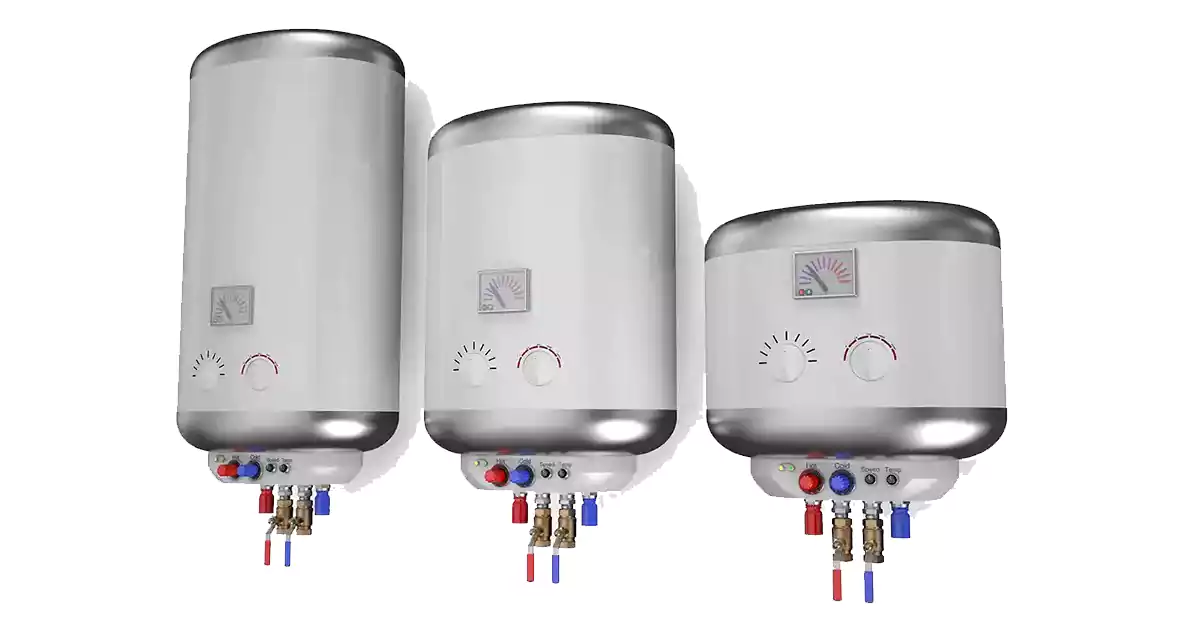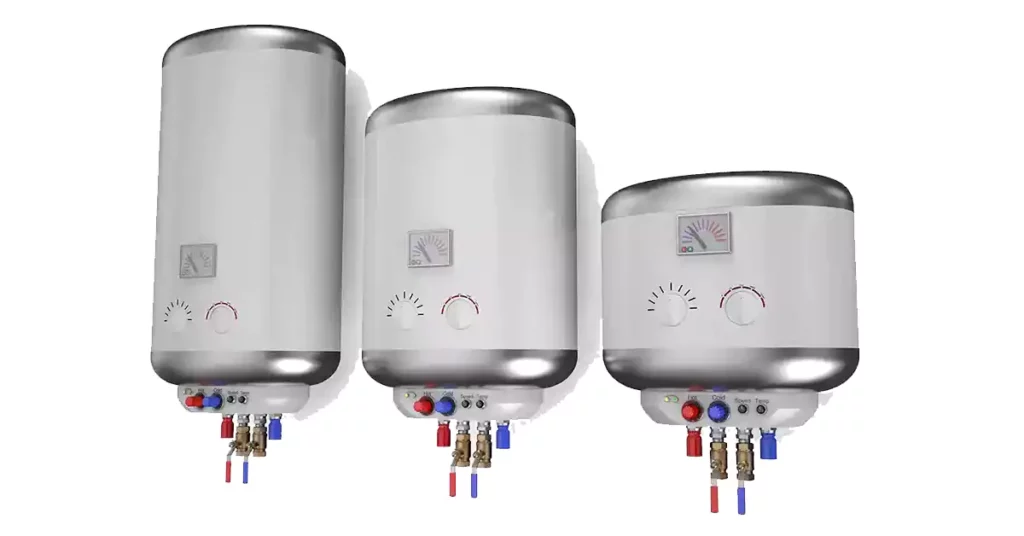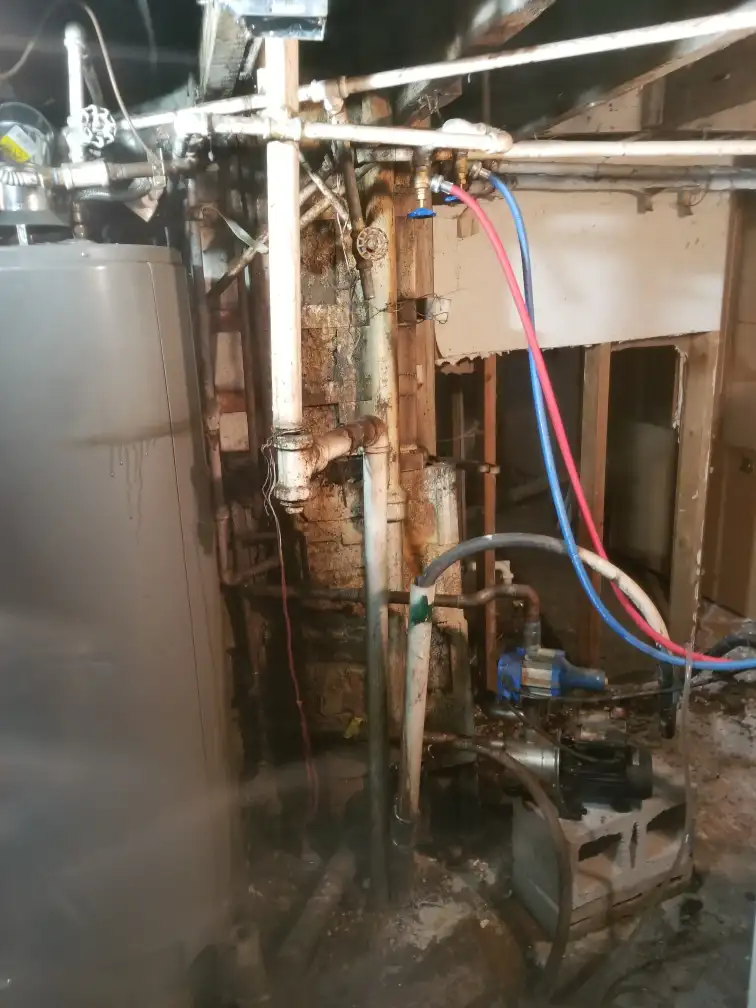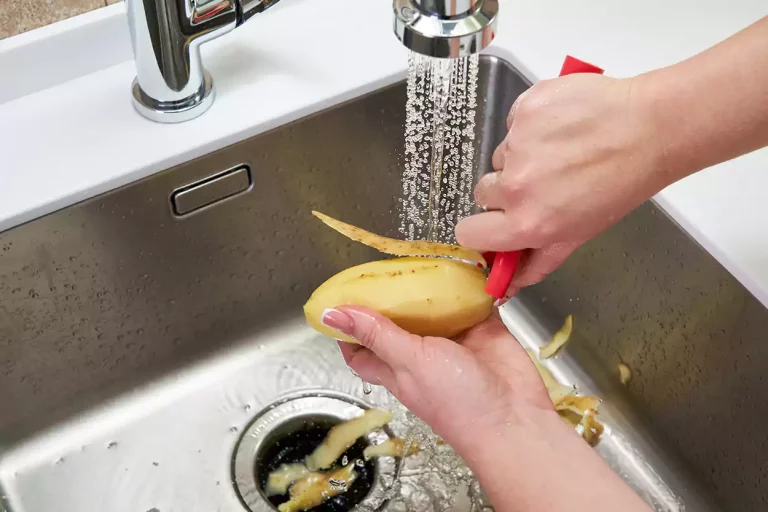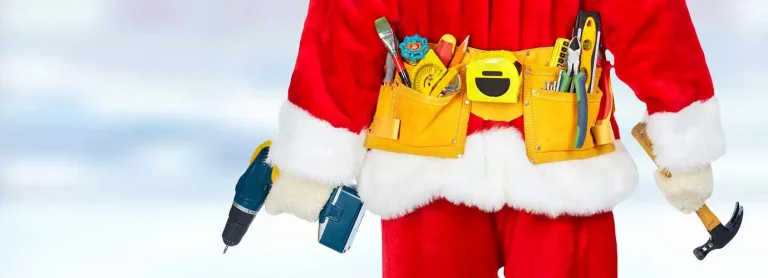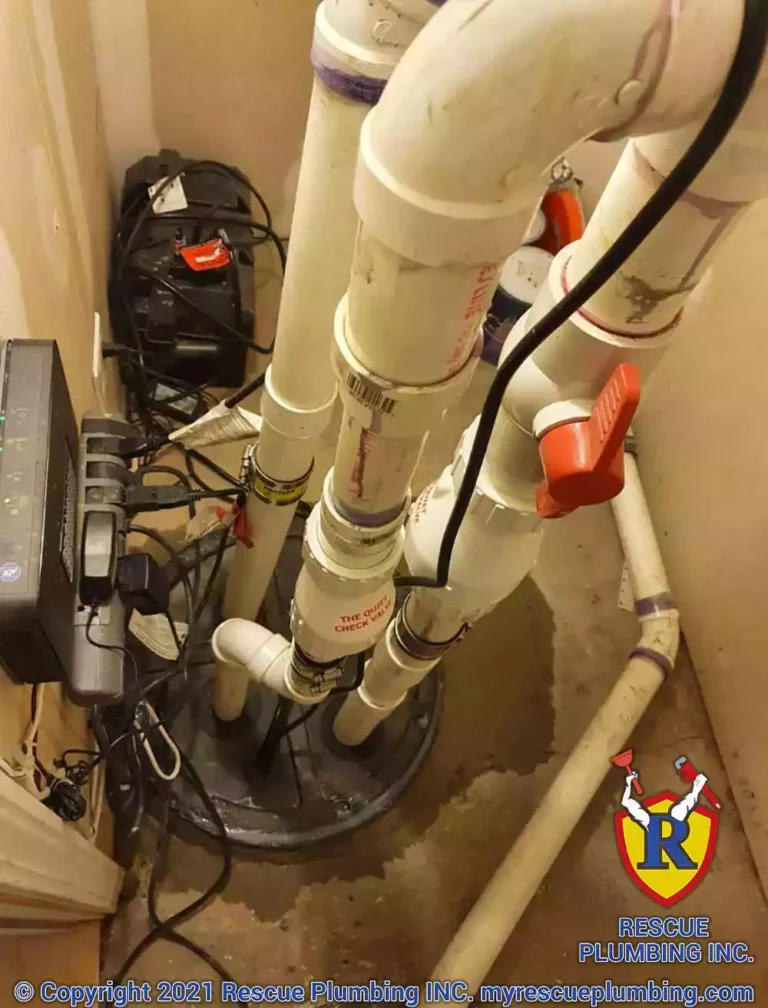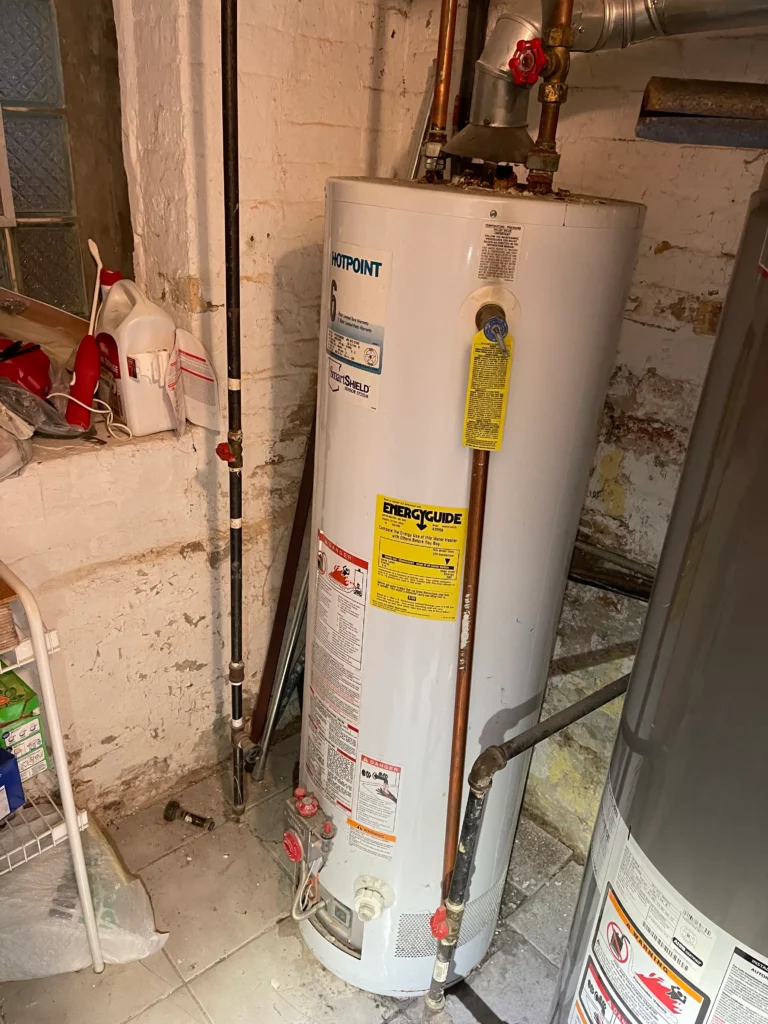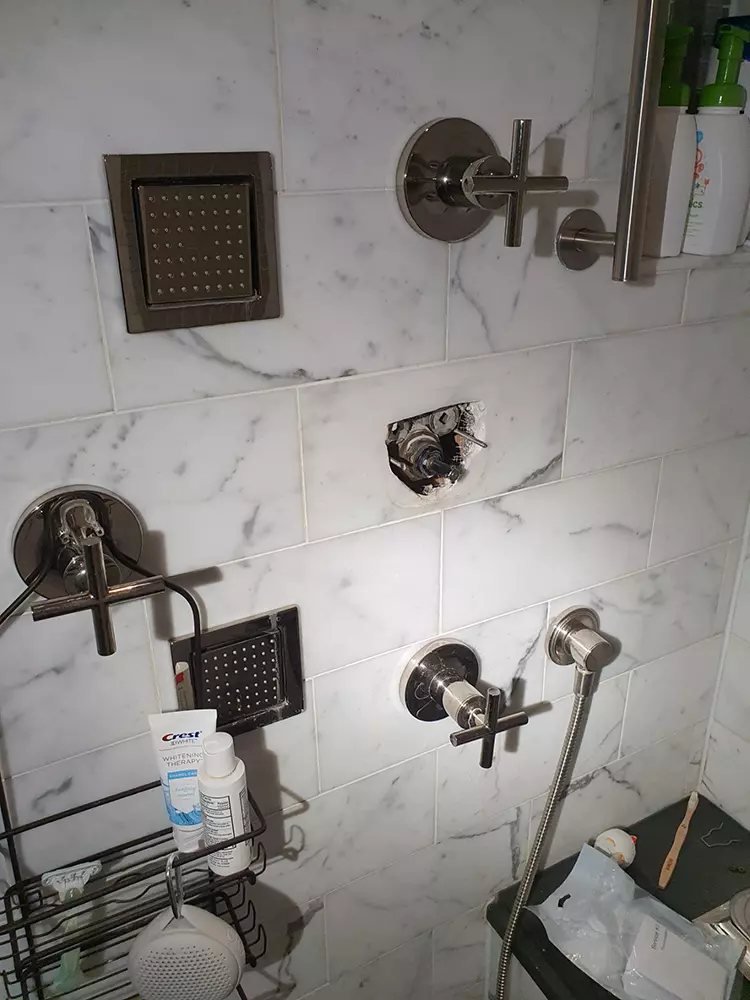Hot Water Heater Repair and Installation: Your New Year’s Resolution
It’s that time of year again! The New Year is here and it’s a great opportunity to think about the upcoming year. One thing you should be thinking about is if you need to hire a plumber to help you with a hot water heater repair. If you have an older model, it might be time for a replacement. Here are some things to consider when looking for a water heater:
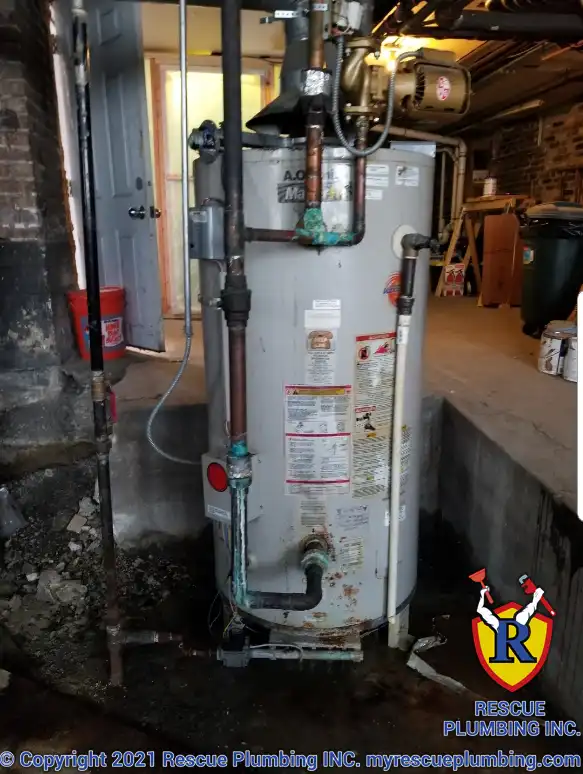
Is it worth it to repair a hot water heater in the New Year?
If your water heater is still heating and delivering hot water, then you are likely fine.
However, if your water temperature is dropping with the hot water turned all the way up, you have a problem.
Whether you have an electric water heater or gas water heater, you likely need a Rescue Plumbing licensed plumber. We’ll come and show you your hot water heater repair, replacement, or installation options.
How long does a water heater last?
The average lifespan of a water heater is between eight and twelve years.
However, if you have hard water or your water heater is not insulated properly, it might only last 5-6 years.
It is recommended to drain your water heater every six months to a year. This keeps it clean by flushing out the sediment and prolongs the life of your unit.
What is the most common problem with a water heater?
Water heater repair and installation can be complicated processes. One of the most common problems homeowners face is leaking from corrosion.
If there are any signs that your tank may have leaks or if you notice puddles on the floor around your unit, it might be time to call Rescue Plumbing.
In some cases, these leaks can lead to more serious problems if they go unattended for too long. Mold, water damage, and corrosion are some of the most common problems that can occur.
An anode rod works to help stop corrosion in the water tank by attracting minerals and metals that cause it. If you notice the tank looks corroded or has leaks, the anode rod may not be working or may need to be replaced. Adding an anode rod to your hot water heater is a good preventative measure.
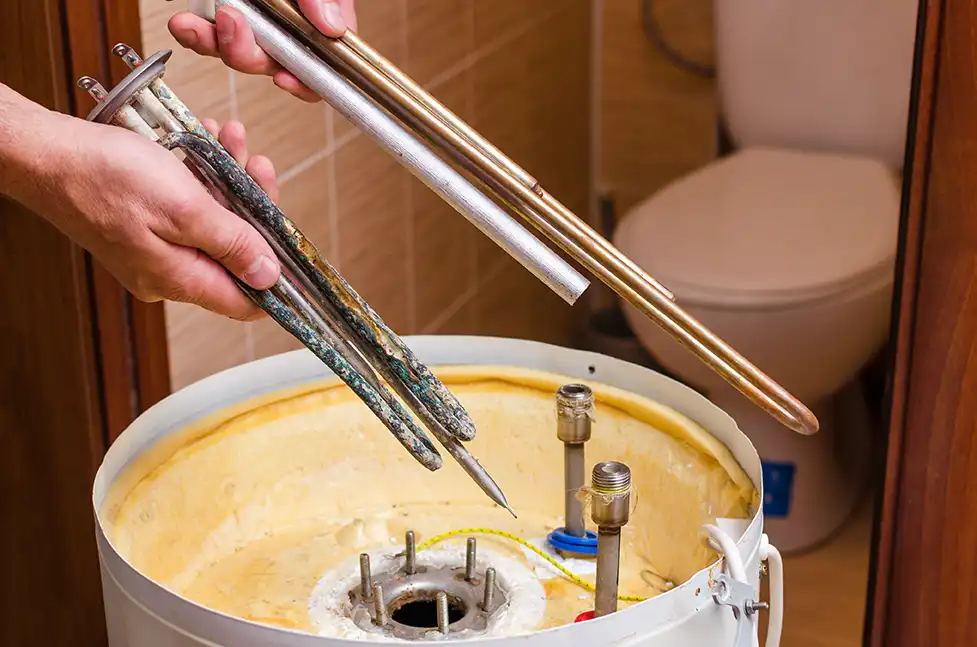
Can an old water heater be repaired?
Water heaters often come with warranties, so depending on what is broken you might be able to fix it yourself or hire a plumber to replace your hot water heater.
It’s worth noting that if your tank has been leaking and corroding, your warranty might no longer be valid, so it’s a good idea to check with the manufacturer.
In some cases, you can replace surrounding attachments like valves, power supplies, or connecting pipes. If your case is more serious, like a rusted out tank, we recommend a full replacement.
What should I look for in a hot water heater installation?
Before you start looking at hot water heater installation options, it’s important to figure out what type of unit will work best for your home.
Once you know that, then you can determine the features and technologies available in each model that may or may not be a good fit on top of figuring out if any repairs might be needed first.
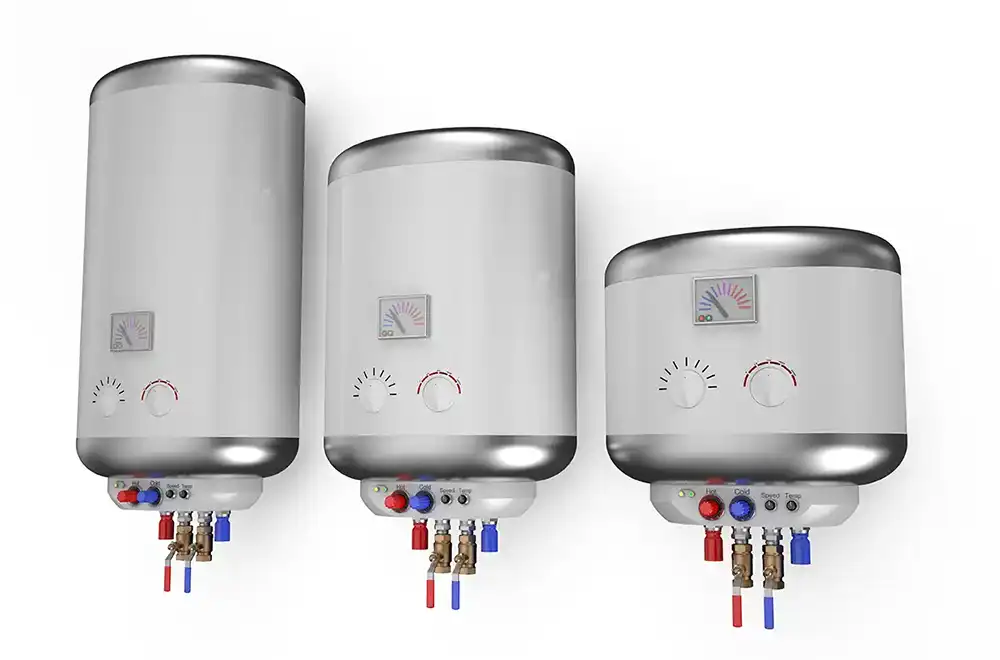
The features and technologies you should be looking for will depend on what your needs are. If you’re looking for a water heater that can provide endless hot water, then you’ll want to look into tankless models.
If you have a large family or like taking long baths, then you might need something with a bigger capacity such as a gas water heater or a tank-style electric water heater.
Our plumbers are trained to help you make the best decision for your home. Call our friendly staff today (773) 799-8848!
Features to look for in a hot water heater
Types of Water Heaters
There are three common types of water heaters that you may have – a gas water heater, an electric hot water heater, or a tankless water heater.
Either gas water heaters or electric water heaters make up the top options available for homes today. Both come in tank or tankless varieties.
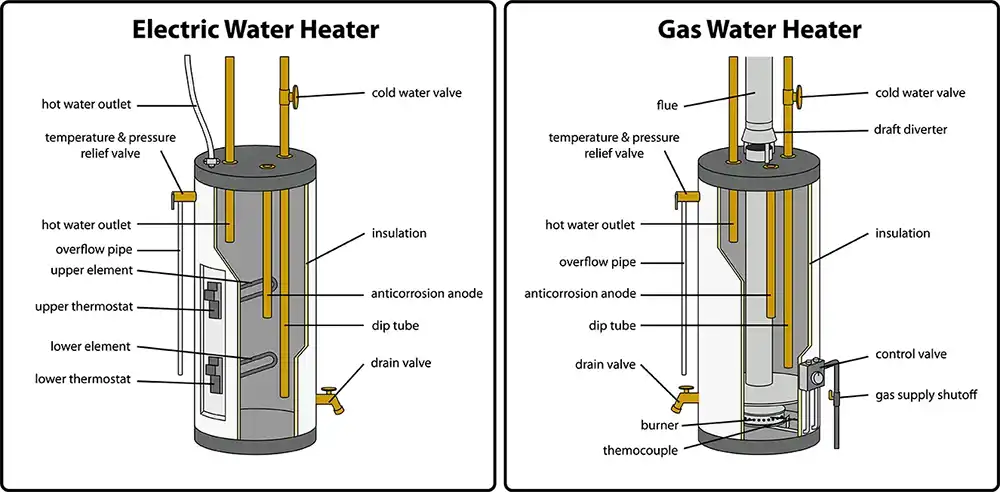
Gas Water Heaters: Tank Style Heaters vs. Tankless Heaters
Gas water heaters are by far the most common types of water heaters and come in two types: tank heaters and tankless. They all have a gas burner, gas control valve, pilot light, and heating element to control the flow of gas and control the water temperature.
Tank models heat hot water in a tank, while tankless water heaters (no tank to store hot water) only produce as much as you need right when you turn it on. Both heat a burner to heat the hot water via a pilot light.
Typically with tank water heaters, it will take two hours for the water to heat up from an empty tank.
Electric Water Heater: Tank vs. Tankless Water Heater
Electric units are very common because they’re inexpensive to install and run well with most homes.
With tank-style installation electric water heaters run on electricity and offer an electric heating element connected with wires to your circuit breaker.
There is no water tank for a tankless electric water heater. The unit will heat water directly with an electric element usually at point of use.
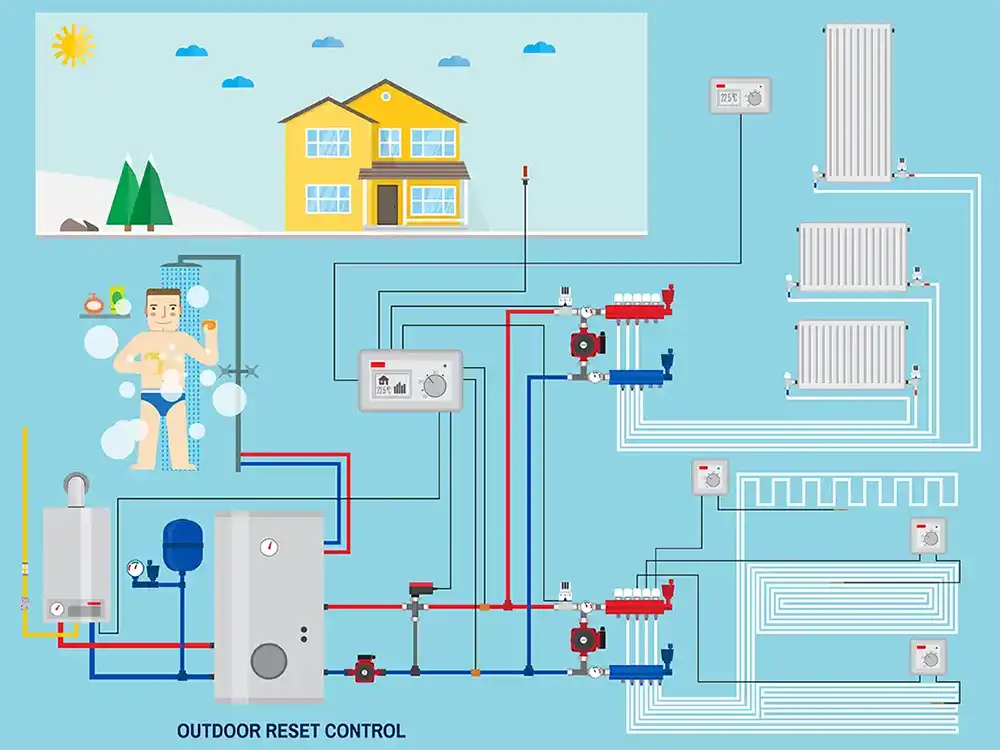
Tankless Water Heaters: Pros and Cons of Tankless Units
When it comes to tankless water heaters, there are many benefits.
First, unlike a traditional electric water heater that stores hot water and heats it as you use it (tank-style), tankless units provide endless hot water with no wait time whatsoever.
Second, they’re more energy efficient than gas or standard electric models. The unit only heats water as needed.
On the downside, tankless water heaters can be more expensive to install and may not work as well in colder climates.
What to do if your temperature pressure relief valve (TPRV) is leaking?
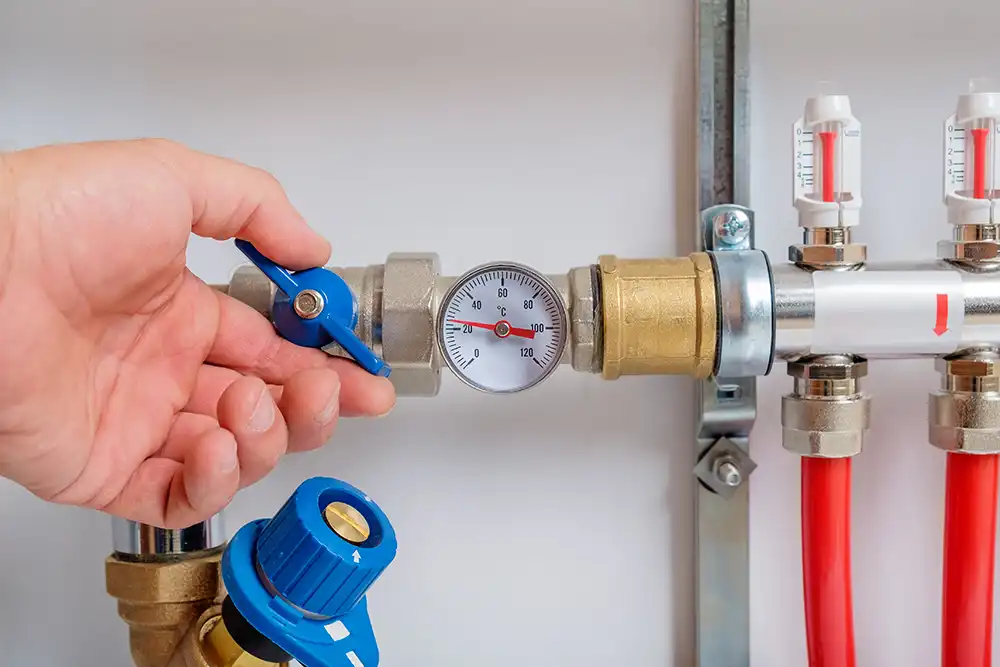
Your water heater’s pressure relief valve is there to protect your home’s plumbing system from excess heat or high pressure.
The valve will open up when the temperature in the tank gets too hot or if it senses that there is too much pressure on the cold water pipe that connects to the cold water supply. If you notice a steady stream of water coming from the valve, you might need to have the valve adjusted or replaced.
The pressure relief valve attaches to a pipe protruding out of your hot water heater tank. This means that if there is too much heat in the tank for some reason (for example insufficient insulation), then the temperature will rise and start opening up the valve.
If the valve is not working properly it is possible you will get a leak or your water heater or pipe attached to it can burst. That is why we recommend calling a Rescue Plumbing professional this year for your water heater repairs!
What if my upper thermostat or lower thermostat isn’t working properly?
The upper thermostat is a coordinator between the two heating elements. When it senses that water in the top part of the tank has reached an appropriate temperature, the lower element turns on and vice versa for when cool enough with this system’s coordination!
If either one isn’t working properly, you will have hot water problems and should call Rescue Plumbing (773)799-8848!
Can I Install a Water Heater Myself
We don’t typically recommend that homeowners install hot water heaters on their own, but if you’re looking to save money, sometimes the DIY replacement method is the most economical option.
If you decide to do a water heater replacement on your own (and we recommend hiring a professional plumber from Rescue Plumbing if you don’t), there are several things that will make your life easier.
First, remove your old water heater
First, check connections on the water heater and disconnect its cold water pipes, hot water pipe, and pressure valve from it. You need to make sure you have access to all of the pipes and power supplies before beginning work. To begin the installation of your new water heater, follow the steps below:
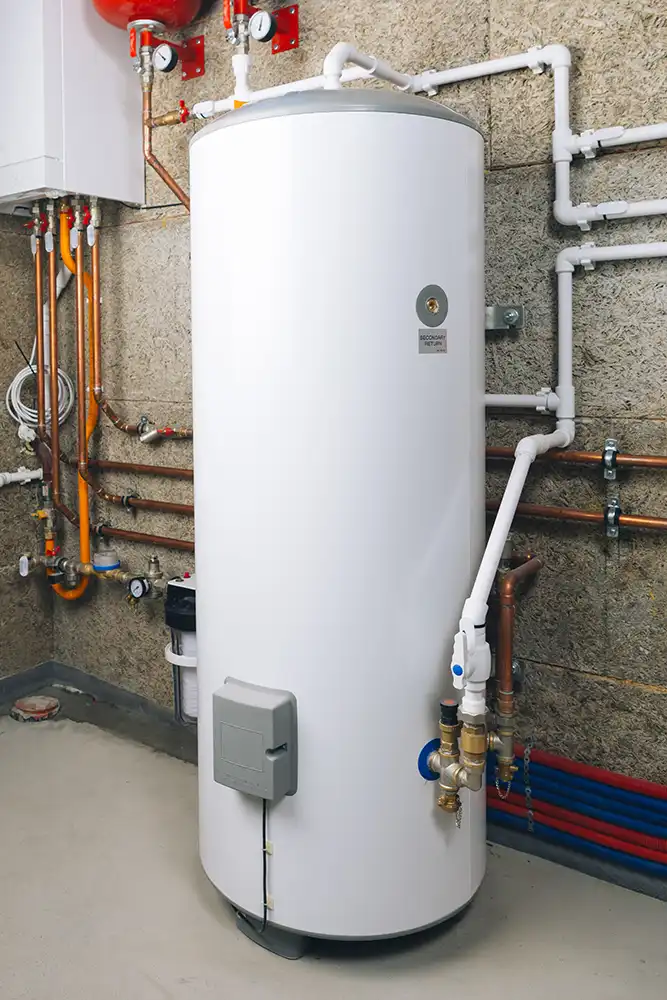
Steps to install a new water heater
- Make sure to shut off your home’s water supply before starting any installation work;
- Drain the water heater expansion tank and water heater through each one’s discharge pipe and drain valve completely before disconnecting any pipes or fittings. Be sure to have a large enough drain container to catch all the water. It should only take an hour to fully drain your tank;
- Label the wires before disconnecting them from the circuit breaker (this will save you time when it’s time to reattach the wires);
- If you’re installing a new tankless water heater, be sure to get one with a vent kit with the necessary vent pipes.
- If you’re replacing an electric water heater, make sure to get one with the correct amperage and voltage;
- Make sure all of your gas fittings are compatible (if your unit did not come with new flexible copper pipes);
- Ensure you have an access panel to the water supply for both hot and cold water;
- Fill your hot water heater by turning on the water main. When you fill it you will hear water flowing into the tank. After you fill it you will hear the water flow stop.
Be careful when handling heavy items during installation. Don’t injure yourself!
Once you have your new water heater attached to your home’s pipes and pipe systems, carefully follow the manufacturer’s instructions for installation. Connect the power supply and you’ll no longer have no hot water!
If you’re not comfortable with any of these steps or feel like you could use some professional help, please don’t hesitate to call Rescue Plumbing. We would be happy to come take a look and give you a free verbal estimate for your new hot water heater.
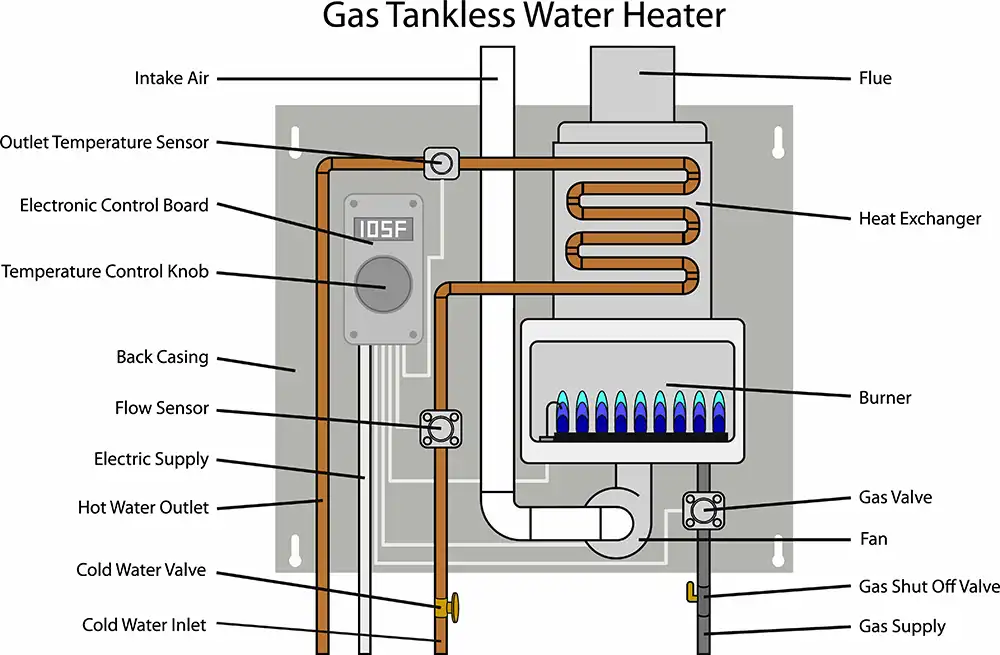
How do I install the water heater expansion tank?
The water heater expansion tank is a great way to maintain your home’s plumbing system.
It also serves as an overflow receptacle, absorbing excess volume of heated or supply pressure fluctuations that may occur when you turn on the faucet at night for example! It connects via a pipe to the main shut off valve to relieve pressure on the hot water tank connected.
Just call our professionals and a Rescue plumber will install the expansion tank correctly.
But if you’re doing a water heater replacement yourself, it connects to the natural gas water heater via a pipe in for cold water and releases the water through a pipe to act as the pressure regulator to the pipe for the main water shut off valve of the water heater. Simply detach and reattach with the necessary tools to do the job.
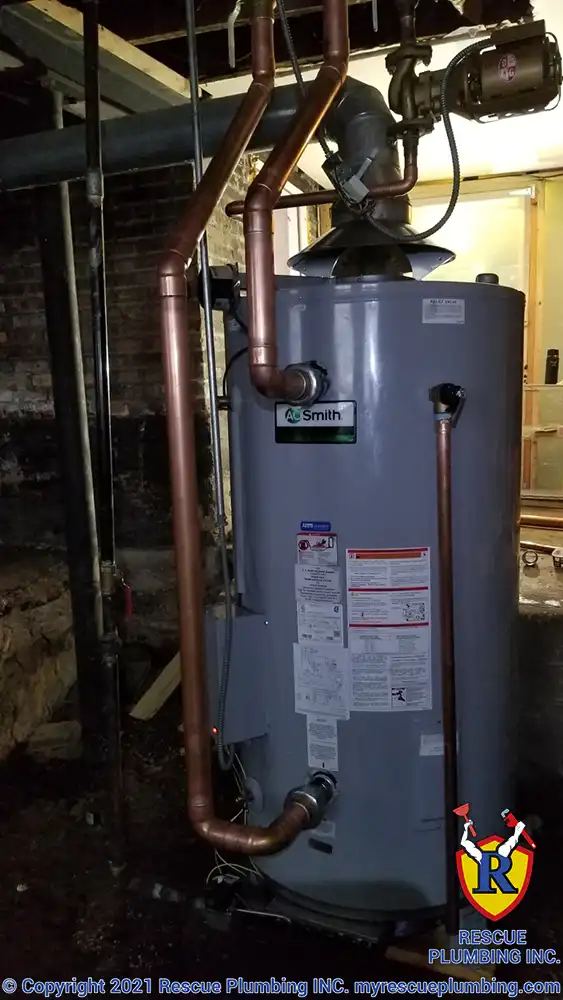
How much should it cost to replace my water heater?
The average cost of installation to replace water heater can be quite costly. There are several things that play into the cost of your hot water heater installation or replacement, including:

Where should I go for water heater installation in the New Year in Chicago?
If your Chicago area home is in need of a new water heater get help! Don’t let the winter bring cold showers and low temps to your tap this New Year! Rescue Plumbing has been providing the best quality service for years to Chicagoland with fast response times. We’ll fix your problem and give you peace of mind knowing it’s taken care of quickly and correctly the first time. Call for your hot water Rescue today! (773)799-8848.
